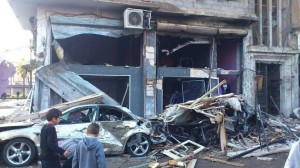Social Media Monitor 3-12-2012

Car bombs return
Footage of the explosion in Homs – Youtube
Last week saw two devastating bombings take place in Syria. A bombing targeted President’s Square in the town of Jaramana outside Damascus and another a crowded street in Al-Hamra district in central Homs. The latter was the first of its kind in Homs since the start of the turmoil in Syria last year. Both blasts resulted in a large number of victims, particularly in Jaramana, where many paramedics who rushed to rescue the wounded were killed by a series of other explosions.
Activists who administrate the satirical Facebook page La Teshleshna Mashloushin expressed their grief for the casualties.
“Today, there were men who had their last cigarette and cup of coffee, mothers who finished knitting their last yarn ball and children who took their last sandwich to school… May the martyrs of Jaramana rest in peace.”

Activist Chaoud Taha lamented the children killed by the blasts.
“Adults are looking for their loved ones under the rubble and a child is crying while looking for his only toy which he got for his birthday. Meanwhile, humanity keeps falling and falling and falling,” he wrote in Facebook.
While no one claimed responsibility for the bombings, Syrian activist Abdul Aziz al-Aedy held either the regime or Al-Qaeda responsible: “I can assure you that the criminal mind behind the Jaramana bombings today belongs to either the regime or Al-Qaeda, which is not different from the regime.”
Al-Zaatari ‘death camp’
‘The death camp’ is the new name given to Al-Zaatari camp in Jordan where Syrian refugees live, after three children died due to extreme cold and lack of adequate medical care.
Administrators of the Syrian Revolution News Facebook page tweeted: “The tragedy of the Syrian refugees in Zaatari keeps being repeated. Three children died today because of the extreme cold and lack of heating!! Thank you for your Arab [sympathy]!”
Activist Chaoud Taha asked about the absence of human conscience.

“We are [killed] by gunshots and under the rubble by a deadly criminal while death chases us across the border. Our children are dying of severe cold in Zaatari and human conscience is dying from moral decadence,” he wrote on Facebook.
Activist Mulham al-Jundi blamed both Saudi Arabia and Jordan.
“Did the government of the Kingdom of Saudi Arabia not hear that three children died from the cold in the # Zaatari camp? Where are the donations sent to the refugees in # Jordan?” he wrote on Twitter.
“This is Damascus”
“This is Damascus” is the only sentence that Syrians from different political backgrounds agreed to write on their social media pages, demanding the return of the Internet to Syria after an interruption that lasted from Thursday November 29 through Saturday December 1.
This campaign echoes the Suez War in 1956, or the Tripartite Aggression, as it is known in the Arab world. At the time, Damascus Radio launched the call “From Damascus, this is Cairo”, announcing the continuation of the Egyptian Radio’s broadcast after the destruction after the radio’s transmission stations were destroyed by French and British aircraft.
Millions of Twitter and Facebook users wrote “This is Damascus” and mentioned where they live during the

three-day service interruption.
Blogger Razan Ghazzawi (@ RedRazan) expressed her disappointment.
“Without our brave and wonderful rebels inside, Facebook seems pale, dull and full of unconfirmed news,” she tweeted from Sweden.
Finally, when the Internet coverage was restored there were overwhelming comments expressing joy.
“Your virtual return made me feel that I will soon physically return [to Syria]. Welcome!” composer Said Mirkhan, who lives in the United Kingdom, wrote on Facebook, addressing people inside Syria.
Actress Yara Sabri congratulated Syrians her own way.
“Vroum vroum vroum; the bus is running (: Congratulations for the return of the Internet,” she wrote on Facebook.
Various explanations of the event were contributed. Some attributed the interruption to the regime’s fear of the “Pride Strike” which was called for by most of the opposition groups. Others said it was done to shut down communication while the regime forces tried to regain control over the area near the Damascus Airport.
Opposition activist Louay Hussein, who is the head of the Movement to Build the Syrian State and who lives in Syria, seized the opportunity to invite activists to return to the squares of Damascus, stressing the importance of their presence on the ground rather than being online.
“Damascus is our terrain, Damascus is our home, Damascus shall survive as long as we inhabit it. It will not be absent if there was no Internet; it will die if it was deserted by its people.”
Writer Onsi al-Hajj angers opposition supporters
The Lebanese daily Al-Akhbar published on Saturday December 1, a comment by the Lebanese writer Onsi al-Hajj, denouncing the news about the intention of Syrian opposition militiamen to abduct Syrian actress Sulaf Fawakherji. Fawakherji is known for supporting the regime.

“Sulaf Fawakherji is a magnanimous and dignified woman; a transparent woman and a heroine in both acting and reality… if this news is true then Syria’s tragedy has hit bottom.”
Hajj managed to anger many opposition activists by his eulogy of the Syrian actress, one of whom was writer Subhi Hadidi.
“Hajj is scared that ‘Syria’s tragedy has his bottom’ not because of 40 thousand martyrs and three million houses demolished, but because Sulaf Fawakherji might be kidnapped!” he wrote on Facebook.
